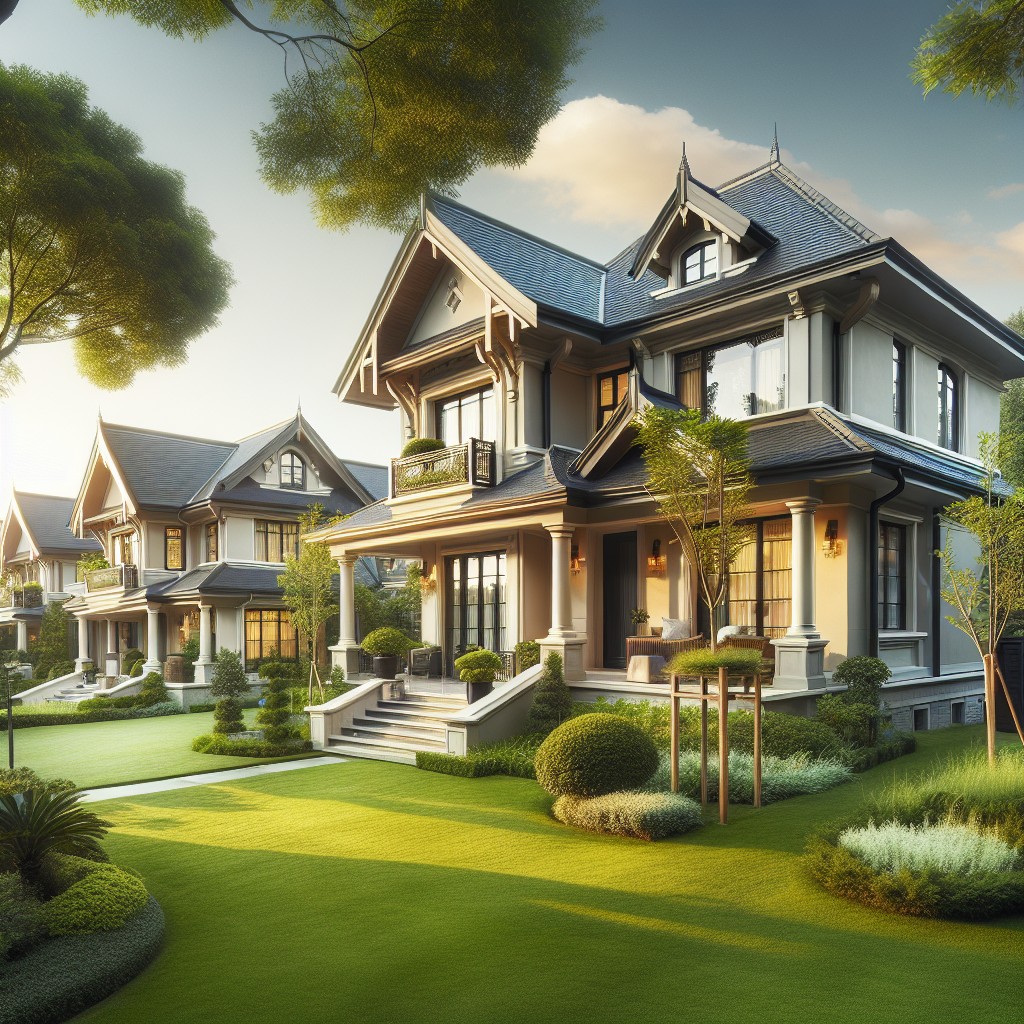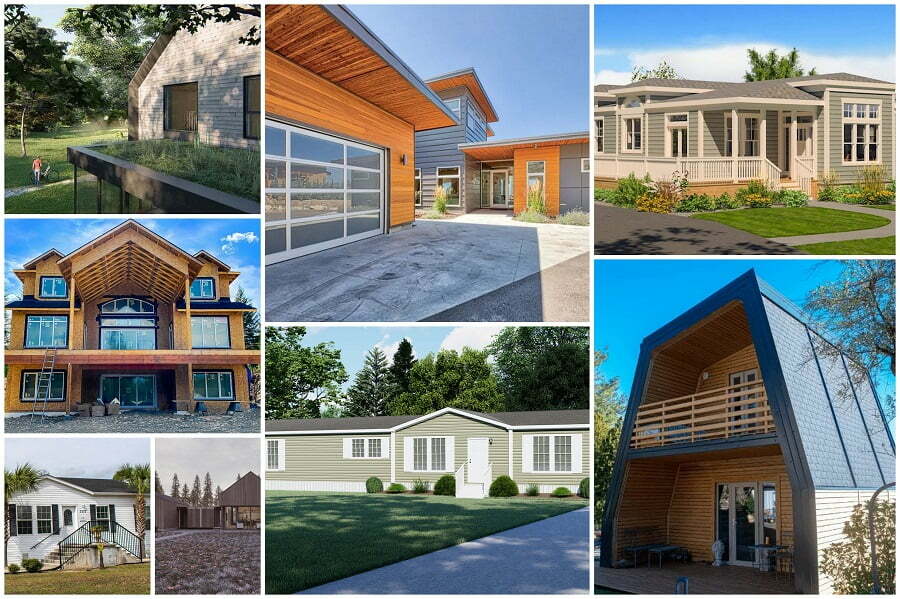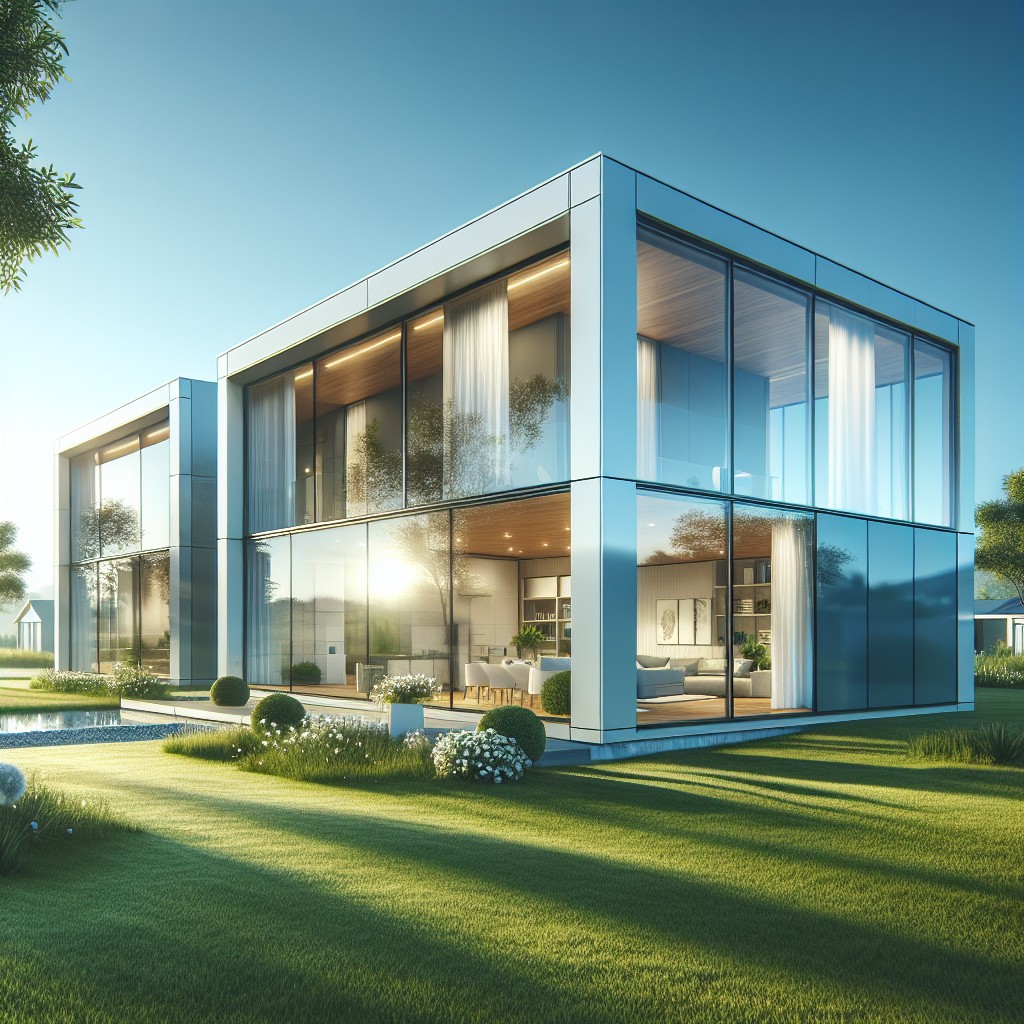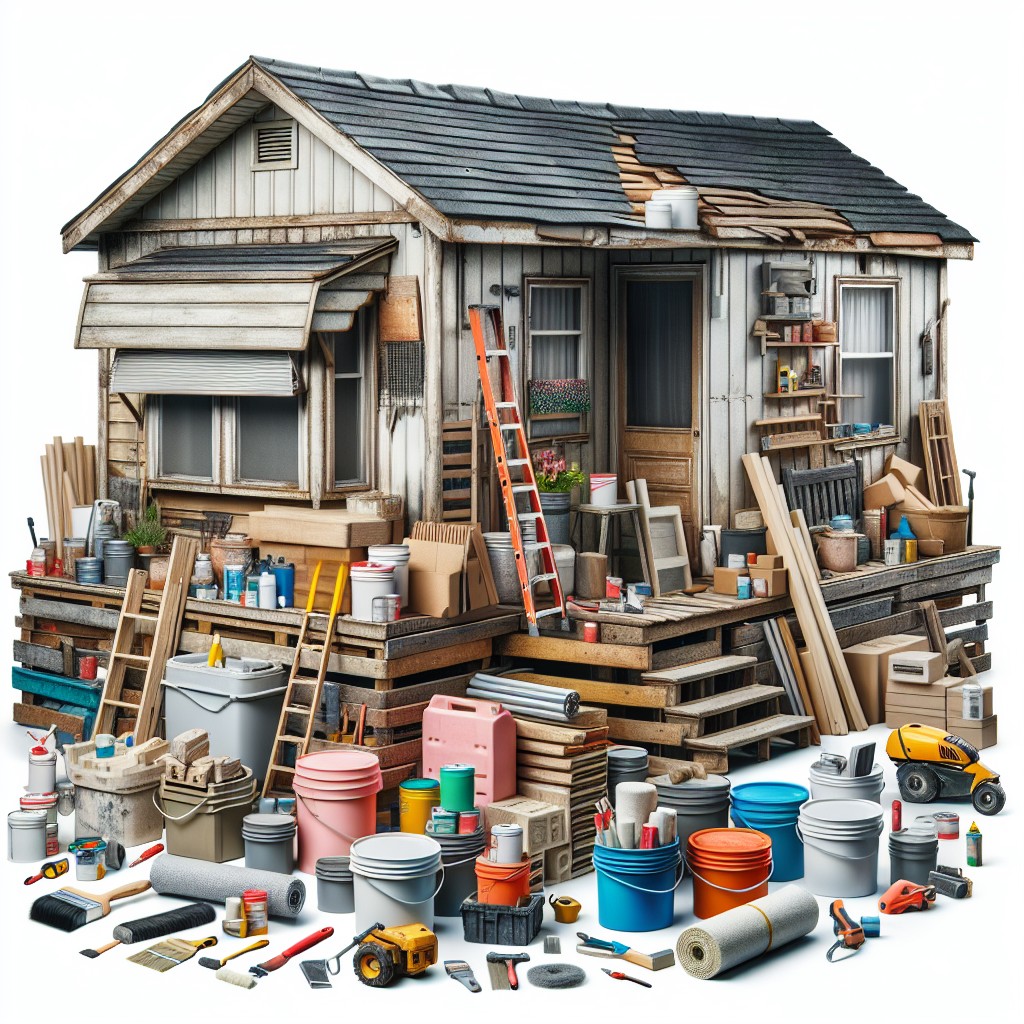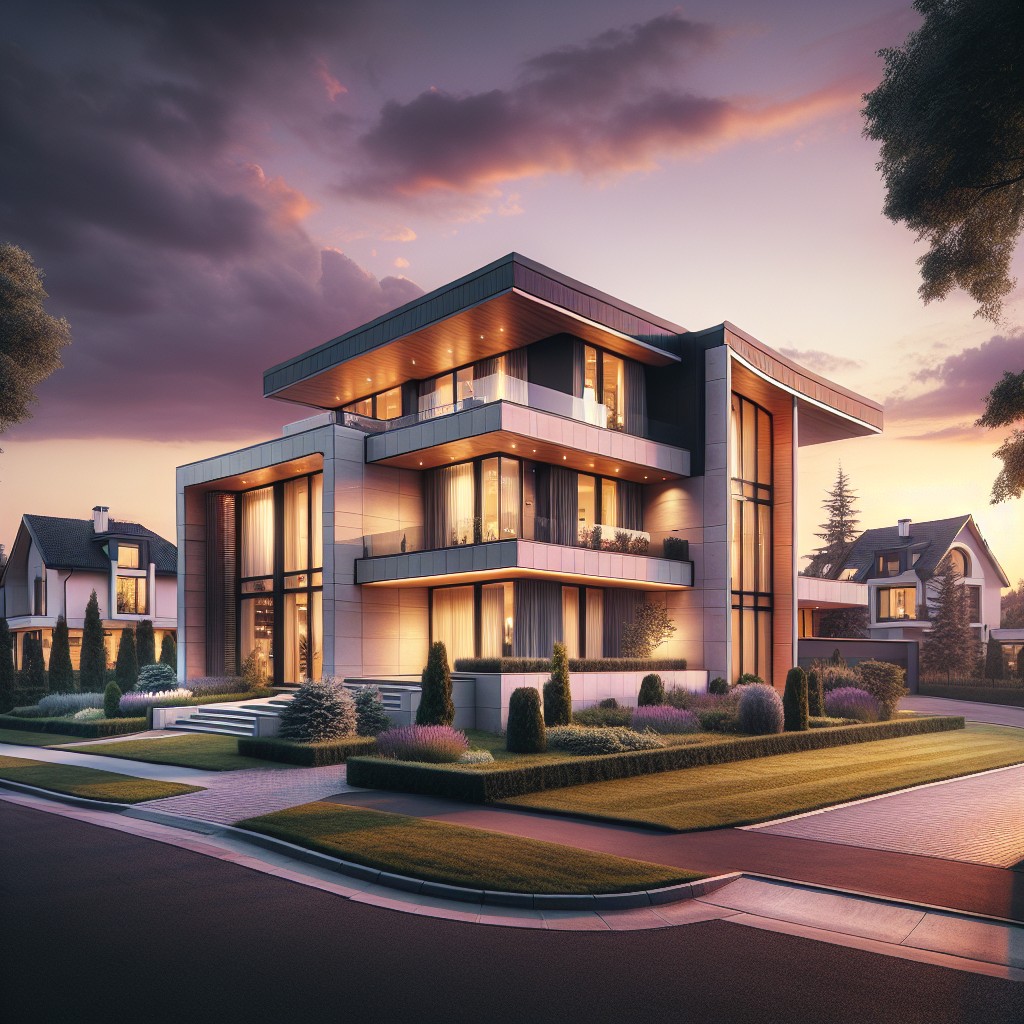Last updated on
Because sustainable living is more than just a trend, it’s vital to understand the role manufactured home communities in Florida play in championing eco-friendly living.
Manufactured home communities in Florida offer an affordable, sustainable, and environmentally-friendly living option for countless individuals and families. These communities, equipped with modern amenities and located in some of the most beautiful corners of the state, have witnessed an increasing demand in recent years.
Diving deeper into this article will equip you with a wealth of knowledge about these communities – exploring the ease of installation, their energy efficiency, customization potential, and even provide insights on the top-rated manufactured home communities to consider in Florida.
Key takeaways:
- Affordability: Lower price tag compared to traditional homes.
- Amenities: Access to swimming pools, fitness centers, and more.
- Maintenance: Community management handles common area upkeep.
- Location: Close proximity to shopping, healthcare, and natural attractions.
- Sense of Community: Designed to promote interaction among residents.
Benefits of Living in Manufactured Home Communities in Florida
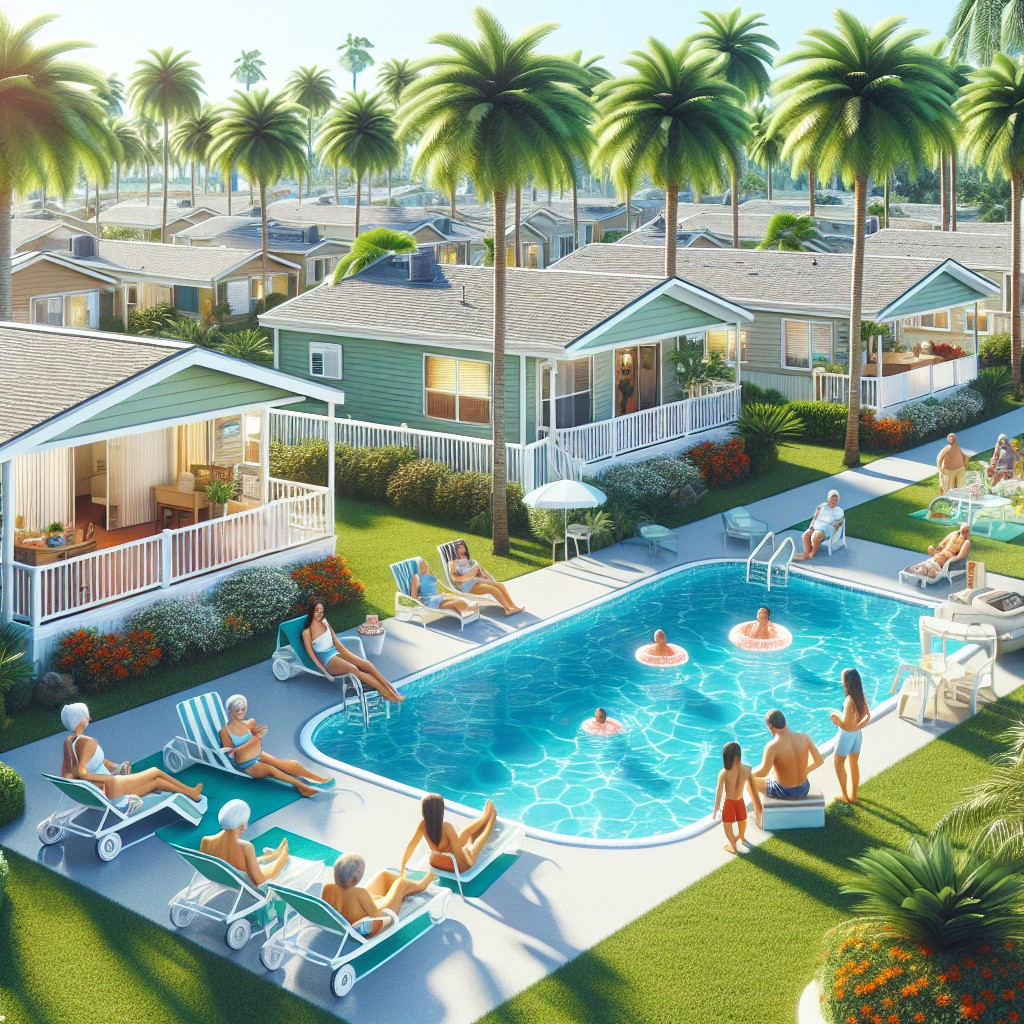
Living in Florida’s manufactured home communities presents several advantages catering to a broad spectrum of preferences and lifestyles. Residents often enjoy:
1. Affordability: Typically, these homes come with a lower price tag compared to traditional site-built houses, providing an economical housing solution without sacrificing comfort or style.
2. Amenities: Many communities offer a wealth of facilities such as swimming pools, fitness centers, clubhouses, and social activities that foster a sense of community and enhance quality of life.
3. Maintenance: The community management often handles common area upkeep, reducing the burden of landscape maintenance on the individual homeowner.
4. Location: Communities are often strategically situated close to shopping centers, restaurants, healthcare facilities, and natural attractions like beaches and state parks.
5. Sense of Community: With communal spaces and planned social events, these neighborhoods are designed to promote interaction and camaraderie among residents.
6. Flexibility: Homeowners can choose from various models and customization options to fit their needs and personal tastes, ensuring their living space reflects their individual lifestyle.
7. Climate: Florida’s warm climate is particularly appealing to those wishing to avoid colder weather, making it an ideal locale for year-round living or seasonal residences.
Types of Manufactured Home Communities
When exploring manufactured home communities in Florida, potential residents will encounter a variety of options, each catering to different lifestyles and preferences:
- Family-Friendly Communities: Designed for residents of all ages, offering playgrounds, parks, and family-oriented activities.
- Senior Communities: Exclusively for those 55 and older, focusing on peace, quiet, and amenities tailored to retirees.
- Luxury Communities: Featuring high-end facilities, such as clubhouses, fitness centers, and organized social events.
- Budget-Friendly Communities: Providing affordable living solutions without compromising on basic amenities and community spirit.
- Golf & Country Club Communities: Targeted at golf enthusiasts, with courses and country club memberships integrated into the living experience.
- Eco-Friendly Communities: Prioritizing sustainability with energy-efficient homes and green spaces.
Each type offers a unique set of features geared towards enhancing the living experience of its targeted demographic.
+ Communities in Florida
Catering specifically to active adults over the age of 55, these communities offer a unique blend of leisure and convenience. Residents can enjoy a calendar full of activities designed to foster social connections and holistic well-being, including fitness classes, hobby clubs, and community gatherings.
The facilities typically include amenities such as swimming pools, clubhouses, and often, golf courses. This creates an environment where fitness and social interaction is easily accessible. Importantly, these communities provide a sense of belonging and an opportunity for residents to engage with peers who share similar life stages and interests.
Furthermore, maintenance services are often part of the package, allowing residents to enjoy a worry-free lifestyle without the burdens of traditional homeownership tasks like lawn care and property upkeep. This elevated standard of living enables more time for relaxation and enjoying the sunny Florida climate.
Another appealing factor is the added security, with many communities offering gated access and on-site security personnel, giving residents peace of mind about their safety.
When considering a move to a 55+ community in Florida, potential residents should visit various locations to experience the unique culture and atmosphere of each, ensuring the right fit for their lifestyle and preferences.
Amenities in Florida Manufactured Home Communities
Many communities cater to the active lifestyle Florida is renowned for, featuring swimming pools and fitness centers that allow residents to enjoy the sunshine while staying healthy. Clubhouses serve as social hubs, where neighbors gather for events, games, and communal meals. Outdoor enthusiasts appreciate on-site facilities such as tennis courts, shuffleboard areas, and walking trails, promoting an active community vibe.
Beyond recreation, convenience is a key amenity – with laundry facilities, on-site management, and maintenance teams ensuring smooth day-to-day living. For those looking for a little extra peace of mind, gated entries and community watch programs often enhance the feeling of security.
Family-friendly communities may offer playgrounds and organized activities for children, fostering a welcoming environment for residents of all ages. Some communities go further, providing spaces like community gardens or pet parks, catering to the diverse interests of their inhabitants.
Connectivity is also considered, with many communities providing Wi-Fi access in common areas. This enables residents to stay connected with loved ones and encourages the use of digital amenities for entertainment and communication.
Accessibility to local services such as shopping, healthcare, and dining, often factors into the amenity offerings, with some communities providing shuttle services or being strategically located to keep these essential services within easy reach.
Overall, the amenities offered are designed to enrich the lives of residents, creating a balance of leisure, convenience, and community engagement.
Location Considerations for Manufactured Home Communities in Florida
When scouting for the ideal spot in a Florida manufactured home community, proximity to daily necessities is a key factor. Look for communities within a reasonable distance from grocery stores, medical facilities, and pharmacies. Given Florida’s abundant sunshine, you might also prioritize access to outdoor recreation areas such as parks and beaches.
Transportation routes are crucial, especially if you plan to commute or travel frequently—check for easy connections to major highways and public transit. Those who prefer tranquility might opt for a location away from high-traffic areas, surrounded by the natural beauty Florida offers.
Another important aspect is the community’s vulnerability to extreme weather, such as hurricanes. Communities further inland may pose less risk than those directly on the coast. However, if a coastal lifestyle appeals to you, seek communities with robust weather preparedness strategies and structures built to withstand such conditions.
Lastly, the cultural vibe of the surrounding area can greatly affect your quality of life. Some may enjoy being near vibrant cities like Miami or Tampa for the urban culture and amenities, while others might prefer the laid-back charm of smaller towns or the cultural richness of historic St. Augustine. Consider your lifestyle preferences to ensure your chosen community aligns with them.
Cost of Living in Manufactured Home Communities in Florida
Manufactured home communities offer an affordable alternative to traditional real estate, especially in a state like Florida where housing prices can soar. The cost of purchasing a manufactured home is typically lower than that of a site-built home, allowing for significant savings on initial housing expenses. On top of that, the efficiency of factory-built homes leads to reduced maintenance costs over time.
Monthly expenses in such communities are generally predictable, covering lot rent, which often includes amenities such as community pools, clubhouses, and maintenance of common areas. Utilities may also be lower due to the energy-efficient nature of newer manufactured homes. However, it’s essential to factor in the fees for community services and possible homeowner association (HOA) dues.
A key financial consideration is the depreciation of manufactured homes, which can affect long-term investment value. Nonetheless, for those prioritizing current affordability and a lower cost of living, these communities can provide a comfortable and cost-effective lifestyle.
Additionally, potential tax advantages exist, as in some cases, manufactured homes can be classified as personal property rather than real estate, resulting in a different taxation structure. Future residents should consult a financial advisor to understand the specific implications.
By opting for a manufactured home community, residents can enjoy the perks of homeownership without the hefty price tag often associated with Florida’s housing market. It’s a wise choice for retirees, young families, and others seeking to stretch their housing dollars in the Sunshine State.
Comparison of Manufactured Home Communities Versus Traditional Housing
Manufactured homes offer a unique blend of affordability and lifestyle benefits compared to traditional housing options. They are typically less expensive per square foot and can be built quickly, which means faster move-in times. The communities often come with added perks like pools, clubhouses, and structured social activities, which might not be standard in a conventional neighborhood without high HOA fees.
On the flip side, traditional homes often come with land ownership, which can lead to greater long-term equity. They also might offer more variety in architectural styles and a sense of permanence. However, they generally require more maintenance, and the initial investment can be significantly higher than in a manufactured home community.
It’s important to consider these trade-offs in light of personal lifestyle preferences and financial goals. Each housing option has its merits, and understanding these differences can help in making an informed decision that aligns with individual needs and priorities.
Sustainability Practices in Florida Manufactured Home Communities
Embracing sustainable living, many communities in Florida are incorporating eco-friendly practices. These include:
- Energy Efficiency: High-performance insulation and windows, coupled with energy-efficient appliances, reduce the carbon footprint and utility bills.
- Renewable Energy Sources: Adoption of solar panels is prevalent, harnessing plentiful sunshine to power homes.
- Water Conservation: Low-flow fixtures and native, drought-resistant landscaping help preserve Florida’s precious water resources.
- Recycling Programs: On-site facilities promote recycling of paper, plastic, and metal, making it convenient for residents to participate.
- Green Building Materials: Use of sustainable materials in construction and repairs minimizes environmental impact.
- Public Transport Access: Proximity to public transport options reduces reliance on individual vehicles, curbing emissions.
- Community Gardens: Spaces for residents to grow their own produce fosters a sense of community and reduces food miles.
By integrating these elements, communities not only support the environment but also offer a healthy, cost-effective living space for residents.
Community Events and Social Life in Manufactured Communities
Manufactured home communities often foster a vibrant social atmosphere where events and gatherings are central to the lifestyle. With organized activities, clubs, and special interest groups, these communities create opportunities for residents to connect, learn new hobbies, and stay active.
From craft fairs and potluck dinners to dance classes and golf tournaments, there’s an array of events to suit diverse interests and promote camaraderie among neighbors.
Regularly scheduled game nights encourage friendly competition while book clubs and gardening societies offer more relaxed environments for sharing interests. Seasonal celebrations and holiday-themed parties ensure that there’s always something to look forward to throughout the year.
Fitness classes tailored to different levels of ability help residents stay healthy together, and community volunteer projects strengthen the bond between neighbors by giving back.
These social engagements not only enhance the quality of life within the community but also support a sense of belonging and foster lasting friendships among residents.
Safety and Security Features in Manufactured Home Communities
Selecting a community with robust safety features offers residents peace of mind. Here’s what to look for:
- Gated Access: Many communities control entry with gates or security personnel, limiting access to residents and their guests.
- Well-Lit Streets: Adequate lighting is crucial for evening walks and helps deter potential intruders.
- Emergency Plans: The best communities have clear guidelines for hurricanes, fires, and other emergencies.
- Neighborhood Watch Programs: These initiatives encourage community engagement in monitoring and reporting suspicious activities.
- Security Cameras: The presence of cameras acts as a deterrent to crime and allows for monitoring of common areas.
- Background Checks: Some communities conduct checks on new residents, promoting a secure living environment.
- Speed Limits: Low speed limits help protect pedestrians and cyclists within the community.
- Smoke Detectors and Fire Extinguishers: Ensure that homes comply with fire safety codes, offering an extra layer of protection.
Always inquire about specific security measures when considering a community to ensure it aligns with your safety priorities.
The Process of Choosing the Right Manufactured Home Community
When selecting a manufactured home community in Florida, prioritize your needs and lifestyle preferences:
Assess Your Lifestyle: Are you looking for a quiet retreat or a vibrant community? Factor in your daily routine and social needs.
Location is Key: Proximity to medical facilities, shopping centers, and entertainment venues can significantly impact your quality of life.
Amenity Check: List the amenities that matter most to you – such as pools, fitness centers, or community gardens – and ensure your chosen community offers them.
Budgeting: Understand the cost breakdown including lot rent, utilities, and any community fees to ensure it aligns with your financial plan.
Understand the Rules: Review the community’s rules and regulations to make sure they are compatible with your lifestyle.
Visit Multiple Communities: Experience the atmosphere firsthand and talk to residents to get genuine feedback.
Long-Term Planning: Think ahead about the ease of mobility within the community as your needs change with time.
Review the Lease Agreement: Thoroughly examine the terms of the land lease and any contingencies it may include.
By taking these steps, you can make a well-informed decision about your future home in the Sunshine State.
Insurance for Homes in Manufactured Communities in Florida
Insuring your home in a Florida manufactured community isn’t just a wise decision—it’s essential for protecting your investment against unforeseen events. Here’s what you need to consider:
1. Coverage Types: Standard policies typically include protection against natural disasters, theft, and fire. However, in Florida, it’s critical to look for policies that offer specific coverage for hurricanes and flooding, given the state’s susceptibility to these disasters.
2. Liability Protection: Besides protecting the structure and contents of your home, liability coverage is crucial. It protects you against injury claims or property damage to others that occur on your property.
3. Cost Factors: The age, size, and construction quality of your home will influence premium costs. Homes anchored to the ground, as opposed to those that remain on wheels, may also see lower insurance rates due to increased stability.
4. Discount Potential: Ask about discounts for safety features such as storm shutters, tie-downs, and updated heating systems. Over-55 communities may also offer reduced rates due to the lower risk profile of their residents.
5. Shopping for Insurance: Compare quotes from several insurers to find the best rate and coverage. Consider insurers that specialize in manufactured homes and understand community-specific concerns.
Remember, while the initial cost of insurance might seem like an additional expense, the long-term financial protection it offers is priceless in a state where weather can be unpredictable.
Regulations and Legal Aspects of Living in Manufactured Home Communities
When considering a move to a manufactured home community in Florida, it’s essential to understand the regulatory environment to ensure compliance and protect your rights as a resident:
- Florida Statutes Chapter 723: This law governs mobile/manufactured home park tenancies, providing rights and responsibilities for both park owners and residents.
- Home Installation: Your manufactured home must adhere to Florida’s installation standards, which are designed for the safety and durability of your home.
- Park Rules and Regulations: Each community will have its own set of rules that may cover aspects like pet ownership, noise levels, and use of communal spaces.
- Zoning Laws: Verify the community is zoned correctly for manufactured homes, as this impacts the services available to the community and can affect future resale value.
- Lease Agreements: Review your lease carefully. It should detail lot rent, utility responsibilities, and any other fees or community-specific regulations.
- Homeowner Associations (HOAs): If your community has an HOA, understand your obligations. These associations can enforce community standards and manage shared amenities.
- Eviction Protections: Familiarize yourself with the legal process and protections against eviction from a manufactured home community.
- Rent Increases: State law dictates how and when a park owner can increase rent, requiring advance notice to residents.
Understanding these points can help ensure a smooth and legally secure transition into your new Florida manufactured home community.
Land-Lease Agreements in Florida Manufactured Home Communities
Understanding the specifics of land-lease agreements is vital before moving into a manufactured home community. Here are the key points that shed light on how these contracts typically work in Florida:
- Lease Terms: Typically, residents own their manufactured homes but rent the land, with leases ranging from short-term (yearly) to long-term (10-20 years).
- Monthly Fees: These agreements usually require a monthly fee that covers the plot of land and may include access to community amenities and maintenance services.
- Rent Increases: The agreement should outline the frequency and percentage of potential rent increases, providing a clear financial roadmap for residents.
- Utilities and Taxes: It’s common for residents to pay for their utilities. Property taxes, however, might be lower since they’re often only assessed on the home and not the land.
- Community Rules: Land leases include stipulations on community guidelines which uphold the lifestyle and aesthetic of the environment.
- Selling Your Home: Restrictions on selling your manufactured home and transfer fees, if applicable, should be noted in your lease.
- Ending a Lease: The agreement outlines conditions under which a lease can be terminated, protecting both the resident and community owner.
It’s essential for prospective residents to carefully review these components of land-lease agreements, since they impact one’s living experience and financial obligations.
Tips for New Residents in Florida Manufactured Home Communities
Embrace Community Living: Get to know your neighbors and participate in community events. Building relationships enhances your living experience and fosters a sense of belonging.
Review Community Rules: Familiarize yourself with the community guidelines to ensure you comply with rules regarding pets, noise levels, and property maintenance, thus avoiding any avoidable issues.
Utilize Amenities: Take full advantage of available amenities such as clubhouses, pools, and fitness centers. They’re part of your investment and can greatly improve your quality of life.
Stay Informed: Keep up to date with community announcements, either through newsletters, community boards, or digital platforms provided by the community management.
Be Proactive: If you encounter any issues within your home or the community, report them promptly to management. Quick communication can lead to faster resolutions.
Explore the Area: Get to know the local area outside the community, including shopping, dining, natural parks, and healthcare facilities. This will help you settle in and find your new favorite spots.
Participate in Governance: Attend homeowner association meetings if available, to have a voice in decisions that affect the community.
Budget Wisely: Keep track of your monthly expenses including lot rent, utilities, and maintenance to avoid any financial surprises.
Welcome Visitors: Have friends and family over to your new home. Hosting guests is a great way to share your new lifestyle and create lasting memories.
Contribute: If you have skills or hobbies, consider offering your services or starting a club within the community. Sharing your interests can be rewarding and enrich community life.
List of Popular Manufactured Home Communities in Florida
– Silver Dollar Resort, located in Odessa, offers a unique experience with its on-site 27-hole golf course and large fishing lakes, catering to outdoor enthusiasts.
– Colony Cove by Equity Lifestyle Properties in Ellenton provides waterfront living with boat docks, promoting a relaxing lifestyle by the water.
– The Lakes at CountryWood in Plant City features a blend of golf, waterfront activities, and a plethora of community events, ideal for an active social calendar.
– Lamplighter Village in Melbourne boasts a well-rounded lifestyle with its tennis courts, swimming pool, and fitness center, emphasizing health and wellness.
– Coral Cay Plantation in Margate offers a serene environment with its lush landscape and is conveniently located near urban amenities, striking a balance between nature and city life.
– Rolling Greens Village in Ocala is designed for those seeking the tranquility of country living while enjoying amenities like a newly renovated clubhouse and scheduled community activities.
– Park Royale in Pinellas Park prides itself on a tight-knit community atmosphere, where neighbors quickly become friends during weekly community gatherings and events.
Community Member Testimonials
Hearing directly from residents provides invaluable insights into the lived experience within manufactured home communities. These testimonials often highlight the following:
- Sense of Community: Residents frequently describe a strong sense of belonging and camaraderie with neighbors, with social events and common interest clubs fostering close-knit relationships.
- Affordability: Testimonies typically reflect satisfaction with the cost of living, appreciating the balance of affordability and quality of life.
- Amenities and Activities: Praise for readily available recreational facilities, swimming pools, fitness centers, and organized activities that enhance lifestyle without leaving the community.
- Maintenance and Service: Residents appreciate the convenience of on-site maintenance staff dedicated to ensuring the community remains clean, safe, and well-maintained.
- Location Benefits: Testimonials often point to the strategic location of communities, with easy access to local attractions, healthcare facilities, shopping, and dining.
- Responsive Management: Positive feedback usually includes mentions of management’s quick response to concerns and continuous efforts to improve community standards.
These real-world perspectives help provide a clearer picture of daily life in Florida’s manufactured home communities for potential new residents.
Maintenance and Upkeep in Manufactured Home Communities
Owning a home in a manufactured home community comes with the advantage of shared responsibility for upkeep. Here’s what you can typically expect:
- Community Maintenance: Common areas such as clubhouses, parks, and roads are usually maintained by the community’s management. This means less work for you and beautiful surroundings all year round.
Home Exterior: While you may be responsible for your home’s exterior, many communities offer guidelines and services to assist. This helps maintain a cohesive aesthetic and supports property value.
Lawn and Garden: Often, the community management covers landscaping services for common areas. In some communities, individual lawn maintenance may also be covered in the monthly fees.
Amenity Upkeep: Recreational amenities such as pools, tennis courts, and gyms are maintained by staff, ensuring that these facilities are safe and ready to enjoy without additional work on your part.
Waste Management: Trash pickup is typically included, with designated days for removal, contributing to the community’s cleanliness and convenience.
By sharing the responsibility for maintenance and upkeep, residents can enjoy the perks of homeownership alongside community living’s ease and camaraderie.
How to Get Started: View Our Locations and Find a Community
Embarking on your journey to find the perfect manufactured home community in Florida begins with research. Start by pinpointing the desired region within the state – whether it’s the sun-drenched beaches of the Gulf Coast, the bustling metropolitan areas, or the tranquil charm of the Panhandle.
Next, utilize online resources to create a list of communities in your chosen area. Websites dedicated to manufactured housing, such as the Florida Manufactured Housing Association, offer a wealth of information, including community listings and features.
After compiling a list, prioritize communities based on your specific needs – consider factors like proximity to healthcare, shopping, cultural attractions, and public transportation.
Once you’ve narrowed down your options, reach out to the communities. Schedule visits to tour the facilities, explore the homes, and meet with residents. This will give you a feel for the neighborhood and lifestyle.
Lastly, connect with a local real estate agent who specializes in manufactured homes. Their expertise can guide you through the nuances of purchasing in these communities and assist with any special requirements or questions.
By following these steps, you’re well on your way to finding a community that aligns with your lifestyle and needs.
FAQ
What is the largest manufactured home community in Florida?
The largest manufactured home community in Florida is Barefoot Bay, situated in the unincorporated community of Micco on the Indian River Lagoon.
Are there modular home communities in Florida?
Yes, Florida currently hosts 50 modular home communities with available building options from 40 builders.
What is the average cost of a manufactured home in Florida?
The average cost of a manufactured home in Florida ranges from $30,000 to $80,000 for a single-wide model and from $60,000 to $150,000 for a double-wide model.
Where can you put a manufactured home in Florida?
In Florida, a manufactured home can be placed on standard parcels such as residential home lots in town or rural areas, however, certain counties may restrict them to rural or agricultural areas only.
What are the zoning regulations for manufactured homes in Florida?
In Florida, zoning regulations for manufactured homes vary by county, but typically they must meet specific codes and standards, be properly anchored, and in some areas, are only allowed in designated manufactured home parks.
How does the cost of living in a manufactured home community in Florida compare to traditional housing options?
Living in a manufactured home community in Florida typically costs less than traditional housing options due to lower initial purchase prices and reduced maintenance and utility expenses.
What are some of the key considerations for choosing a manufactured home community in Florida?
Key considerations for choosing a manufactured home community in Florida include evaluating the location, checking community amenities, understanding the home’s energy efficiency and resilience against Florida’s climate conditions, considering the community’s sustainability policies, and inspecting the potential for future home upgrade feasibility.
Related reading:
Table of Contents
